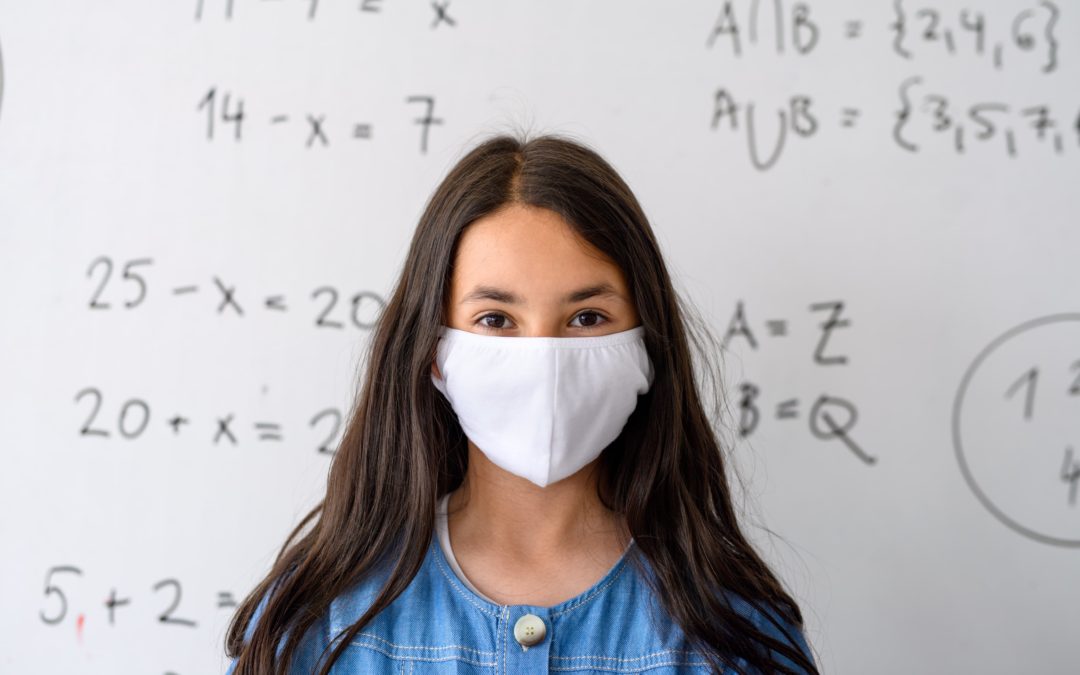With so much changing this fall, it’s hard to know what going “back to school” will look like.
Some schools have postponed the start of the semester multiple times.
Some colleges are giving students the option to go back to class in person, virtually, or in a hybrid format which is leaving them with a lot of difficult decisions to make.
Some K-12 schools are giving families the option to choose in-person or online instruction, while others are adopting a hybrid format or switching to a completely virtual environment.
The only thing we can be SURE of is that the back-to-school season looks a lot different this year than it ever has before. But exactly HOW different, we can’t be sure.
No matter what your teen’s semester is going to look like, there’s a good chance you have a lot of unanswered questions. And if you have to choose whether to go back online or in-person, this leaves you with some pretty difficult decisions to make.
To help make sure you and your teen get all of the facts, we’ve put together a list of questions to consider before heading back to school so you can get a complete and accurate understanding of all the factors that are involved.
For college students…

Enrollment / course registration questions:
- Do all students have the option of deferring enrollment to take a gap semester or gap year? If they chose to take a semester or year off from college, how will this affect their financial aid and/or scholarships?
- Do students have a choice between enrolling for the Fall as an online, hybrid, or in-person student? If so, what is the deadline to decide?
- Are any tuition reimbursements or financial incentives being offered for the different enrollment options? (online, in-person residential, in-person off-campus, etc.)
- How many of the classes that the student is registered for are currently listed as being “online” vs. in person For the in-person classes, are students required to attend in person or is there an online option?
- Are there any changes in schedule students should consider making based on the fact that classes will be online? How would they go about making those changes?
- Have there been any changes in the academic calendar (e.g. finishing classes before Thanksgiving break)?
- If a student gets sick and has to miss a minimum of 2 weeks or more of classes, how will the school handle that? Will students be required to withdraw if they miss more than a certain number of days due to being sick from COVID? Or, does the school have a plan that allows students to make up work at their own pace and take an “Incomplete”?
For students going back in person:
- Has the university waived requirements to live on campus and/or participate in meal plans? If so, what other options are available?
- If the student was doing research or working at a campus job last semester, will that position still be available?
- How many other students are planning to return to campus?
- What rules and restrictions will be in place on campus? How will this impact students’ campus activities, social events, clubs, and sports teams?
- What safety precautions is the campus taking re: Residence halls, dining halls, and social distancing in class? Where and when will people be required to wear masks on campus?
- Do students need to take a course or pass a quiz before they go back on-campus to confirm they understand their school’s COVID policies? If so, what is the deadline to complete it?
- Do students, professors / faculty, and/or university staff have to get tested for the virus before returning to campus? If so, when do they need to take this test?
- Will the school have their own rapid COVID tests available for staff/students/faculty who need to get tested throughout the semester? Does the school have an infirmary set up to quarantine students who test positive for COVID? How will they be handling contact tracing?
- What is the school’s contingency plan to move online if there is a rise in cases? What standards will be used to make this decision?
For students with virtual / online only classes:
- How will classes be administered? I.e. will they be LIVE on a platform like Zoom, or pre-recorded?
- What accommodations and learning support services will be available for students who are attending classes online?
- How will the university be handling courses that typically rely on in-person instruction (e.g. labs, studio art courses, etc.)
- Where will professors be posting lessons, content, and assignments? Is the school mandating a common place for all professors to post info, or does each professor have the freedom to choose their own platform?
- How will students get in touch with professors if they need extra support?
- Are there any supplemental courses or learning the school would recommend?
- Are there any changes to curriculum based on the online format? I.e. for more advanced courses that aren’t geared towards the pace of online learning?
- When and how will students be able to contact counselors and advisors?
- How will students be able to access campus resources? The library, career center, etc.
For K-12 students…
For students going back in person:
- How often will the school be cleaned and disinfected? Are there any other cleaning processes in place (air filters, UV lights, etc.)
- What supplies will be available at the school to keep kids safe, and what should students bring with them? (masks, hand sanitizer, etc.)
- What changes (if any) have been made to keep students safe during transitions between classes, at lunch, during free periods, etc.?
- What testing requirements will be in place for students who are going back in person?
- What policies will be followed if a student, teacher, or staff member gets sick?
- What criteria will be used to determine if the school needs to close? What is the school’s contingency plan if that happens?

For students with virtual / online only classes:
- Will the school still be following their typical schedule (e.g. A/B days, etc.) or are they changing to a different format this year?
- Will there be instruction every day, or are some days designated as independent study?
- Will video classes be live or pre-recorded?
- How much of the class will consist of actual instruction from the teachers vs. independent work time?
- During online classes, will students be able to see and talk with each other or just with the teacher?
- Will there be a set daily schedule for students to follow?
- Who will be teaching the classes — is there a choice? I.e. will they be virtual academy teachers, or the school’s current teachers? What are the pros and cons of each option? How is virtual academy different?
- Where will teachers be posting lessons, content, and assignments? On the main school’s site, or somewhere else? Is the school mandating a common place for all teachers to post info, or does each teacher have the freedom to choose their own platform?
- How will students get in touch with teachers if they need extra support?
- Are there any supplemental courses or learning the school would recommend?
- Are there any changes to curriculum based on the online format? I.e. for more advanced classes that aren’t geared towards the pace of online learning?
- Should your teen consider changing to a different course level if they were planning on taking AP or IB classes this fall?
- Are there any classes students should consider NOT taking now that classes are online? Art, science lab, band, etc. How would students go about making those course changes?
- Are there set teacher office hours and/or study hall sessions?
- When and how will students be able to contact school counselors? How will college counselors be doing appointments in a virtual environment?
- What is the school planning on doing with sports, clubs, and extracurriculars? If sports are taking place, will they still be having races, games, and competitions?
- Is the school creating opportunities for kids to connect with each other either during the school day or after school?
- Who is in charge of setting up support or tutoring groups? How responsible does a parent need to be for checking on their student? Will teachers keep parents in the loop about how their student is doing?
- What options will be available to families if virtual learning is not working for their child?
For students in a hybrid environment:
- Will everyone be doing a blend of online and in-person learning? Or do students have a choice between taking online or in-person classes? If there is a choice, what is the deadline to decide?
- What days and times will students be attending classes in person vs. online? How will this be decided (e..g by grade level, last name, etc.)
- How much of the virtual time will be live instruction vs. recorded lessons or independent learning time?
- Can students switch formats if virtual learning is not working for them? Or move to virtual if they or someone in their household gets sick? How and when can these changes happen?
For students with IEP / 504 plans:
- Will students with IEP and 504 plans still receive the same accommodations and services that were in place before the shutdown? If so, how will these services be delivered?
- Will the school be rolling out any “distance learning plans” or “contingency plans” to adjust services for online classes? If so, what reductions to services do these plans include? Does the district’s offer still constitute a Free and Appropriate Public Education (FAPE)? If families agree to reductions in services now, how hard will it be to get the original services back later?
- If instructors of online classes are NOT the school’s existing teachers, how will the school ensure instructors get brought up to speed on each student’s needs?
- If a child is unenrolled from public school during the pandemic, will they still be eligible for the same special education services when they return? If their eligibility expires and they have to be re-evaluated when they return, would they still be eligible for the same services based on their current level of functioning?
Are there any other questions or factors you’ve been considering as you prepare for this year’s back-to-school season?
I’m going to keep updating this list as we hear back from more schools about what they are planning, so if there are any other questions you’d recommend including, please email me and let me know…I’d love to add them to the list!

Join 11,000+ parents helping their students earn better grades with less stress!

About The Author
Dr. Maggie Wray is a certified ADHD Coach & Academic Life Coach with a Ph.D. in Neurobiology and Behavior from Cornell and a Bachelor’s degree in Astrophysics from Princeton. She founded Creating Positive Futures in 2012 to help high school and college students learn how to earn better grades with less stress. Her team of dedicated coaches is on a mission to empower students to develop the mindset, organization, time management, and study skills they need to achieve their goals.
Related Posts
Other Posts You May Enjoy
How Does Your Teen Handle Failure?
How do you feel about failure?Most of us aren’t crazy about it. But at some point, no matter how hard we try, we’re going to fail at something. So, it’s important to consider how to respond to failure when it does happen, and how to improve our resilience so we’re...
Optimistic students earn better grades
Is your student more of an optimist, or a pessimist? Studies have shown that optimists experience a number of benefits later in life, as compared with their more pessimistic peers, including… Better test scores and higher GPAs Lower levels of stress, anxiety, and...
Starting before you’re motivated
Most students want to do well in school. But wanting to do well doesn't guarantee they will feel motivated to work on assignments in the moment. Even students who usually get good grades have days when they just don’t feel like doing homework or studying for their...




